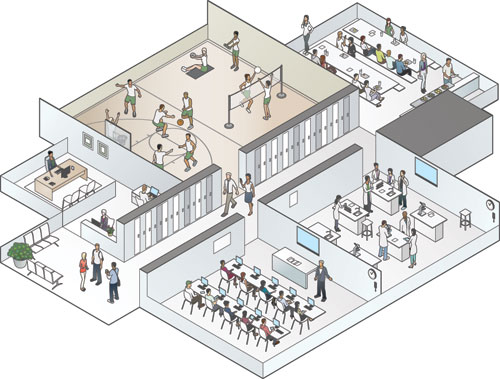- About
- Programs
- Issues
- Academic Freedom
- Political Attacks on Higher Education
- Resources on Collective Bargaining
- Shared Governance
- Campus Protests
- Faculty Compensation
- Racial Justice
- Diversity in Higher Ed
- Financial Crisis
- Privatization and OPMs
- Contingent Faculty Positions
- Tenure
- Workplace Issues
- Gender and Sexuality in Higher Ed
- Targeted Harassment
- Intellectual Property & Copyright
- Civility
- The Family and Medical Leave Act
- Pregnancy in the Academy
- Publications
- Data
- News
- Membership
- Chapters
The University in the Age of the Learning Factory
Dueling narratives in the culture war around higher education.

The culture war over how people understand the American university is entering a decisive stage. Contrasting narratives about the character of the university are used as weapons in conflicts over the university’s purpose, its societal role, and the roles of students, faculty, staff, and administrators.
On one side stands the narrative, painstakingly fashioned over the course of the last century, of the traditional ideal of the university. According to this narrative, the university is a place where knowledge is produced and disseminated by an autonomous professional faculty in accordance with the inherent logic of the academic disciplines within which knowledge production is organized. In the ideal university, students acquire experience through supervised teaching and research under the direction of faculty. On the other side stands the narrative of the university as its emerging operational reality—a corporatized institution designed to prepare workers for global or local labor markets at the least possible expense. In this narrative, the university’s stakeholders are increasingly understood as factors in the production of future workers and as sources of funding (through tuition payments, grants, and alumni contributions). And graduate students, especially, are seen as service workers, contributing to a reduction in the cost of producing and disseminating knowledge for the market.
Continue reading the article (member login required)
Larry Catá Backer is W. Richard and Mary Eshelman Faculty Scholar and Professor of Law and International Affairs at Pennsylvania State University in University Park. Backer teaches and writes in the areas of globalization, institutional governance, and transnational law and finance, and he previously served as chair of Penn State’s faculty senate. His email address is lcb911@ gmail.com.



